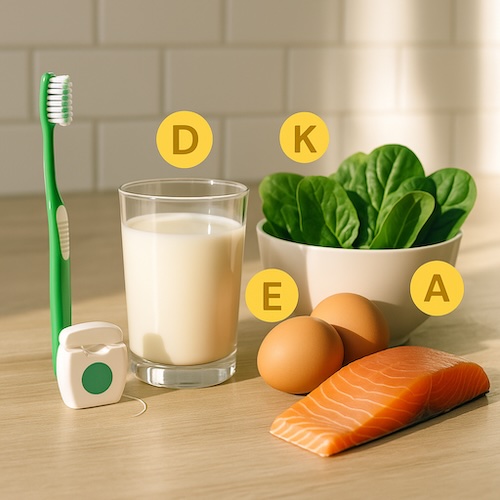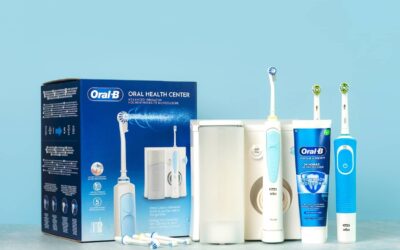Why Nutrition Matters for Oral Health
Diet, vitamins, and oral health are closely connected. Certain vitamin deficiencies can contribute to gum disease, weak enamel, tooth decay, or sensitivity.
In this guide, I’ll cover six of the best nutrients for strong teeth and explain how they support oral health.
Our Top 6 Vitamins for Healthy Gums and Teeth
Important Vitamins for Teeth and Gums #1: Vitamin C
Vitamin C supports collagen formation, making it one of the best vitamins for gum health. A vitamin C deficiency can weaken gums, leaving them more prone to inflammation and bleeding. Vitamin C also has antioxidant properties that help the immune system combat infections in the mouth.
Oral Health Signs of Vitamin C Deficiency
- Gums that bleed easily
- Swollen gums
- Tooth loss (severe cases)
Sources of Vitamin C
To make sure you are getting enough of the best vitamins for gum health, include these vitamin-C rich foods in your diet:
- Citrus fruits (oranges, lemons, limes)
- Bell peppers
- Leafy greens
- Strawberries
- Broccoli
- Brussel sprouts
Important Vitamins for Teeth and Gums #2: Vitamin D
Known as the sunshine vitamin, vitamin D helps support calcium absorption. Together, calcium and vitamin D work together to maintain strong enamel. Healthy tooth enamel is crucial for preventing cavities and decay. Vitamin D also aids in the absorption of phosphorus, another one of the best nutrients for strong teeth.
Oral Health Signs of Vitamin D Deficiency
- Hypomineralisation leading to weakened teeth
- Sensitivity when drinking cold or hot beverages (this is a result of weakened enamel)
- Increased cavities
- Gum disease
Food Sources of Vitamin D
Sunlight is a valuable source of vitamin D, and we get plenty of sun here in Perth! However, certain food sources can also provide vitamin D.
Food sources of vitamin D include:
- Eggs (specifically the yolks)
- Fortified dairy
- Fatty fish, such as sardines
- Mushrooms
Important Vitamins for Teeth and Gums #3: Calcium
Calcium is one of the most crucial nutrients for strong teeth. In conjunction with vitamin D, calcium fortifies tooth enamel. Calcium is also vital for forming and maintaining healthy tooth and bone structure.
Oral Health Signs of Calcium Deficiency
- Increased risk of decay and cavities
- Increased risk of gum disease
- Weakened enamel
- Weak or brittle teeth that are at a higher risk of cracking or damage
- Tooth discolouration
- Increased tooth sensitivity
Sources of Calcium
- Dairy products, such as yoghurt, milk, and cheese
- Leafy greens
- Fish with edible bones, such as canned salmon or sardines with the bones in
- Dried figs
- Almonds
- Sesame seeds
Important Vitamins for Teeth and Gums #4. Phosphorus
Phosphorus works in conjunction with calcium to maintain strong teeth. Phosphorus helps calcium bind to tooth enamel to fortify it against decay.
Oral Health Signs of Phosphorus Deficiency
- Weakened tooth enamel
- Increased cavities
- Premature tooth loss
Sources of Phosphorus
- Meat
- Fish
- Eggs
- Legumes
- Poultry
- Nuts
Important Vitamins for Teeth and Gums #5: Vitamin A
Vitamin A helps maintain healthy mucous membranes and promotes adequate saliva flow. Saliva is crucial for maintaining a healthy pH in the mouth to fight bacteria and decay. Saliva also helps fight bad breath and naturally sweep away food debris.
Oral Health Signs of Vitamin A Deficiency
- Impaired tooth formation
- Dry mouth
- Increased risk of oral infections
- Higher risk of cavities
Sources of Vitamin A
- Carrots
- Sweet potatoes
- Liver
- Eggs
- Dairy products
- Spinach
- Mangoes
- Cantaloupe
Important Vitamins for Teeth and Gums #6: B Vitamins
B vitamins play a crucial role in immune function and tissue repair, helping to maintain healthy gums and teeth. A deficiency in certain B vitamins is linked to mouth sores, inflammation, and other oral health issues.
Oral Health Signs of B Vitamin Deficiency
- Bad breath (specifically, vitamin B12 deficiency)
- Sore, inflamed tongue
- Painful mouth ulcers
- Periodontal disease
- Burning sensation in the tongue and mouth
- Angular cheilitis, a condition involving cracked lips and inflamed, painful cracks at the corner of the mouth
Sources of B Vitamins
- Eggs
- Fortified cereal
- Liver
- Milk
- Yoghurt
- Legumes
- Whole grains
- Nutritional yeast
- Mushrooms
- Poultry
- Leafy greens
- Avocados
- Citrus Fruits
- Nuts
- Shellfish
- Sunflower seed
- Fish
Signs You May Have a Vitamin Deficiency
Your oral health may give clues regarding your overall health. Certain issues with your mouth, gums, or teeth may indicate a vitamin deficiency (Source: National Library of Medicine, The Impact of Vitamin Deficiencies on Oral Manifestations in Children – PMC).
Signs you may have a vitamin deficiency include:
- Bleeding gums
- Mouth ulcers
- Tooth sensitivity (Learn more about tooth sensitivity here: What Are the Causes and Treatments for Sensitive Teeth?)
- Impaired tooth formation
- Periodontitis
- Bad breath
- Detachment of connective tissues that support the teeth, leading to loose teeth
If you notice these symptoms, speak with your doctor or dentist. Your healthcare provider can rule out underlying health conditions and determine the appropriate treatment approach.
You May Also Like: Bad Breath Guide: What is Halitosis and How to Prevent It?
Can Supplements Replace a Healthy Diet?
Even the best supplements cannot replace a healthy diet. Dental health supplements are meant to complement a healthy diet, not replace it. A focus on a balanced diet full of fruits, lean protein, whole foods, and vegetables is an important foundation for health.
Still, there are instances where you may benefit from dental health supplements. Certain health conditions or restricted diets can lead to vitamin deficiencies.
It’s important to work with your dentist or doctor to consider supplements for confirmed deficiencies. A healthcare professional can determine the appropriate dental health supplements to help you.
Combine Vitamins With Routine Dental Care
Along with consuming a healthy, balanced diet filled with vitamin-rich foods, regular dental checkups are vital.
Regular general dental checkups give your dentist the chance to:
- Catch issues early before they progress into complicated, painful, expensive issues
- Educate on the best vitamins for gum health and the right nutrients for strong teeth
- Offer personalised advice on the best oral hygiene routine
- Discuss the best dental health supplements for your oral health needs
You May Also Like: 8 Common Reasons for Toothaches
Learn More with Perth’s Oral Health Experts
The phrase “you are what you eat” clearly pertains to oral health as well as overall health.
Without the appropriate nutrients for strong teeth, your oral health may suffer. Fortunately, a balanced diet focused on whole foods can give you a good foundation for healthy teeth and gums.
At 123 Dental, we provide more than just top-of-the-line dental treatments. We also believe patient education is equally important, which is why we offer personalised advice on overall oral health.
Our preventative services combine regular dental checkups with patient education to set you up for the healthiest mouth possible. Looking for a professional dentist in West Perth or Wembley? Book your consultation today with 123 Dental, the dentist Perth residents have trusted for over 30 years.








